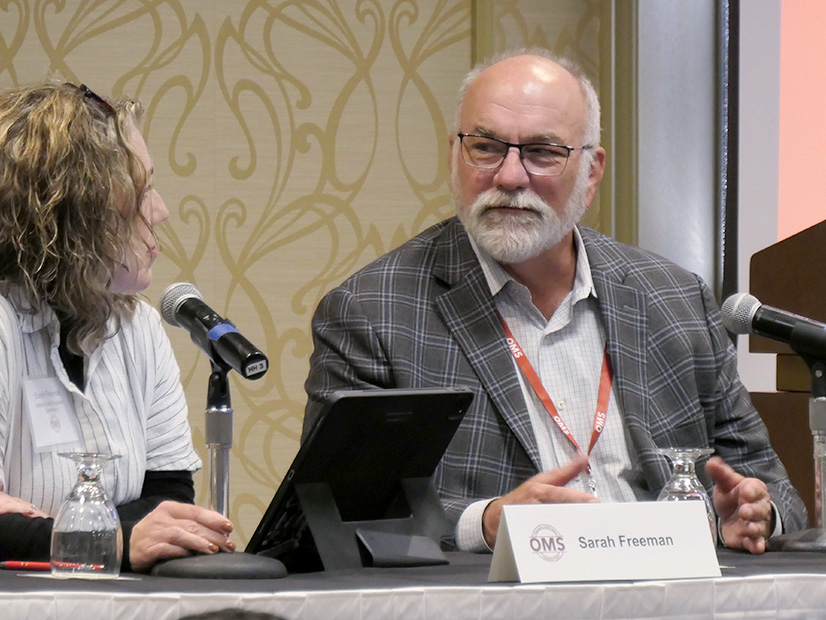
As he prepares to exit MISO, President and longtime employee Clair Moeller delivered parting advice, telling industry players to remember the human aspect in energy.
MADISON, Wis. — As he prepares to exit MISO, President and longtime employee Clair Moeller delivered parting advice, telling industry players to remember the human aspect in energy.
Moeller is set to retire from MISO at the end of 2024; the Organization of MISO States invited him for a final address at its annual meeting Oct. 24. (See Longtime MISO President and COO Moeller to Retire.)
Moeller said a spirit of collaboration will be crucial. He said MISO’s first, $10 billion long-range transmission plan (LRTP) approved in 2022 encapsulated that cooperation.
“Nobody tried to stop it from happening. And that was magic,” Moeller said. “Our society has really learned how to keep stuff from happening.”
Moeller said even when members’ goals don’t run parallel, they can intersect.
“That intersection of interest can get the ball moving forward. We don’t all have to agree. We don’t all have to have the same carbon goals,” he said.
Moeller said the entire industry can use some grace and basic decency as it navigates a bumpy transition.
“We’re working hard on this resource adequacy stuff. It’s wrong. But it’s less wrong than it used to be. And it’ll be less wrong in the future,” he said.
Moeller said MISO, for instance, was too slow to adopt a marginal capacity credit for solar resources based on their contributions. He said if MISO had gotten its vision for solar capacity accreditation in front of stakeholders sooner, the region might boast three times the amount of solar.
Moeller said he was visiting San Antonio in early 2021 when Winter Storm Uri walloped Texas and devastated ERCOT’s grid. He said he was struck when he drove into a Walmart supercenter to find only a bag of Bugles left in the food section.
“We’re three days from chaos. So, this resource adequacy thing is very important,” he said.
Moeller urged the MISO community to have the “grace and openness” to accept feedback and be realistic about the risks that MISO, utilities and states are trying to plan against. He said he often asks staff at MISO which mistake they want to make.
“Because you will be wrong: Which way do you want to be wrong? Do you want to be wrong because you built the thing two years too soon or because you built the thing five years too late?” he asked rhetorically.
Moeller said what he likes about the past five years of brutal winter events is that “everyone has had a turn in the barrel” and has been saved by more far-reaching transmission and a neighbor’s willingness to help.
“Everyone has bailed each other out,” he said approvingly.
Moeller said the LRTP’s goal of pushing energy east will help MISO be of service more often while being able to leverage PJM’s supply.
But he warned that transmission alone won’t keep MISO adequate as the industry moves through the energy transition in an era of growing load.
“The problem that is upon us, we don’t understand mathematically or personally, the risk that we’re taking as we shift the fleet,” Moeller said. He said the industry never has traded old technology for new technology without leaving a significant subset of the old online.
Moeller said in the past, operators needed only to worry about “load forecast and what machines were going to break.” Now, he noted that MISO relies on several probabilistic forecasts to get through an operating day and can find itself calling on operating reserves for a sudden drop in wind output.
He said MISO cannot navigate the energy transition by disregarding load growth, or by ignoring environmental goals and building fossil plants to meet it.
“The risk of not making the transition is not acceptable, either,” he said. “We have a lot of policy goals, and it’s important to have deadlines, but pay attention. Don’t try to reach them regardless of the outcome.”
Moeller invoked the blackout of 2003 as the catalyst for knocking on MISO’s door for a job after spending 25 years at Xcel Energy. He said he was betting at the time the RTO would become ground zero for the “fun work” of working through the aftermath to a more reliable system.
He said his trajectory to MISO was a far cry from his father’s career as a lineman in Iowa. Moeller said his father in 1951 was hand-digging holes for poles that would bring electricity to farming communities for the first time.
“I spent most of my career worrying about reliability and not reliability. People bet their lives and their livelihoods on us getting this right,” Moeller said.
Moeller received a standing ovation from OMS members, regulatory staff and stakeholders attending the meeting.



